Intriguing perspectives on Neanderthals' possible presence in the Bible, challenging conventional views on history, faith, and science.
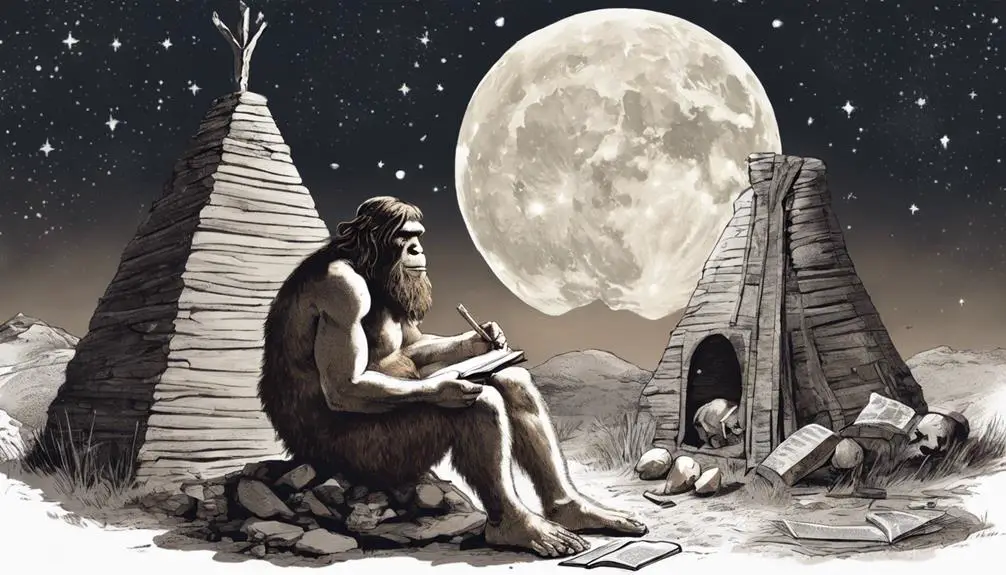
Neanderthals in the Bible
Isn't it fascinating that the timeline of Neanderthals, according to scientific findings, somewhat overlaps with the Biblical timeline of human existence?
You've surely pondered the question of whether these ancient hominids are mentioned in the Bible, or if they had any role in the grand narrative of humanity as described in religious texts.
This discussion, while not providing definitive answers, will offer a platform to explore these intriguing possibilities.
Let's embark on this intellectual journey, ready to challenge our preconceived notions and expand our understanding of history, science, and religion.
Key Takeaways
- Neanderthals, demonstrating intelligence and spirituality, existed prior to the biblical timeline.
- Archaeological evidence shows Neanderthals' capacity for language and rituals, aligning with biblical accounts of early man.
- Speculations exist linking Neanderthals to the 'Nephilim', biblical giants, though no explicit mention exists in biblical texts.
- Balancing biblical interpretations with scientific evidence can provide a fuller understanding of Neanderthals' place in human history.
Understanding Neanderthals: A Brief Overview
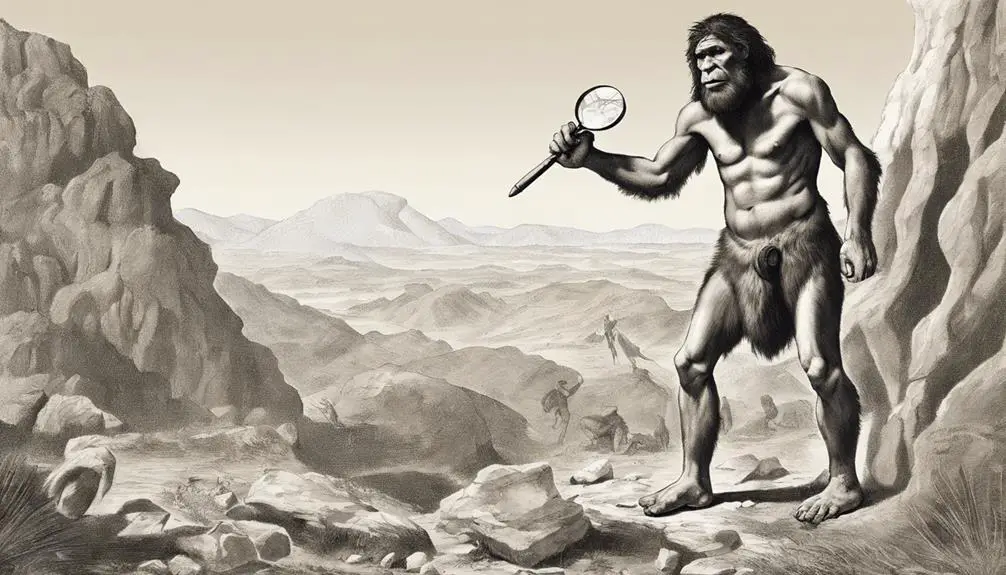
To fully appreciate the role of Neanderthals in biblical narratives, you first need to understand who these prehistoric beings were and their place in the grand tapestry of human evolution. Neanderthals, a subspecies of archaic humans, inhabited Eurasia from circa 400,000 until about 40,000 years ago.
They weren't primitive brutes as often portrayed, but rather demonstrated Neanderthal intelligence through their use of tools, creation of art, and utilization of fire. Moreover, evidence of burial rituals suggests a cognitive capacity to understand death and perhaps even an afterlife.
However, despite their intelligence, Neanderthals faced extinction approximately 40,000 years ago. The causes of Neanderthal extinction remain a subject of intense debate among scholars. Some theories propose that they were outcompeted for resources by Homo sapiens, while others suggest that interbreeding led to their gradual absorption into the Homo sapiens gene pool.
Biblical Timeline and Prehistoric Man
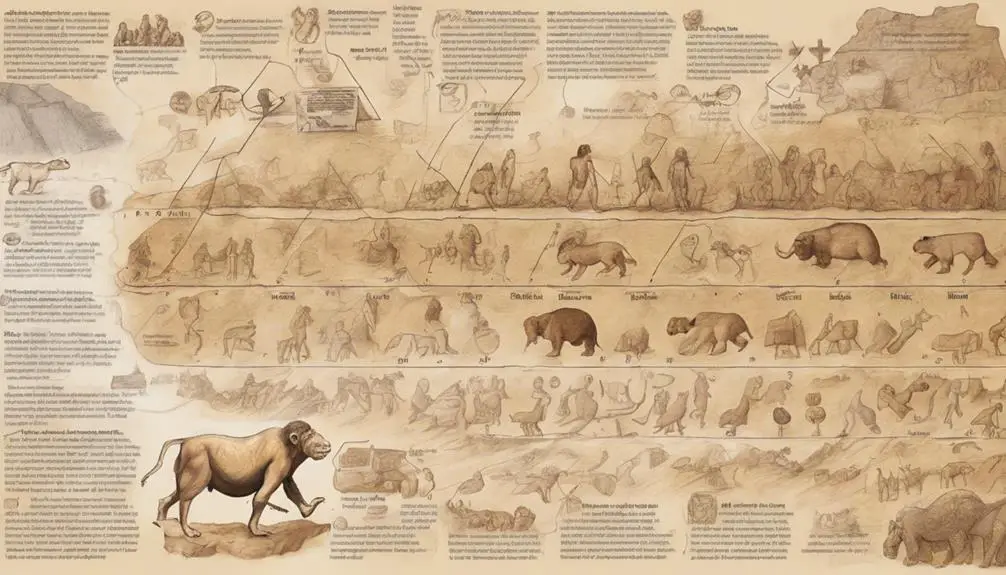
Navigating the complex interplay between biblical timelines and prehistoric man, including Neanderthals, requires a careful examination of both religious texts and scientific evidence. You must understand that religious interpretations can be very diverse and sometimes, they may not align with scientific discoveries. It's essential to approach the subject with an open mind and a willingness to recognize the potential for multiple perspectives.
Experts often encounter challenges when matching biblical timelines to the archaeological record. Typically, the Bible doesn't provide precise dates, and the interpretation of biblical passages often relies heavily on context and linguistic nuances. Moreover, the dating of prehistoric artifacts, including those associated with Neanderthals, relies on techniques like radiocarbon dating, which can yield results spanning thousands of years.
You'll find that assessing the overlap of Neanderthals with biblically documented humans is a complex task. On one hand, some interpret the Bible to suggest that the Earth is relatively young, which contrasts with scientific evidence of Neanderthals' existence over 40,000 years ago. On the other hand, others interpret the Bible more metaphorically, allowing for a harmonization of the biblical timeline with the prehistoric archaeological record. Both viewpoints yield intriguing discussions about the place of Neanderthals within the Bible's narrative.
Potential Biblical References to Neanderthals
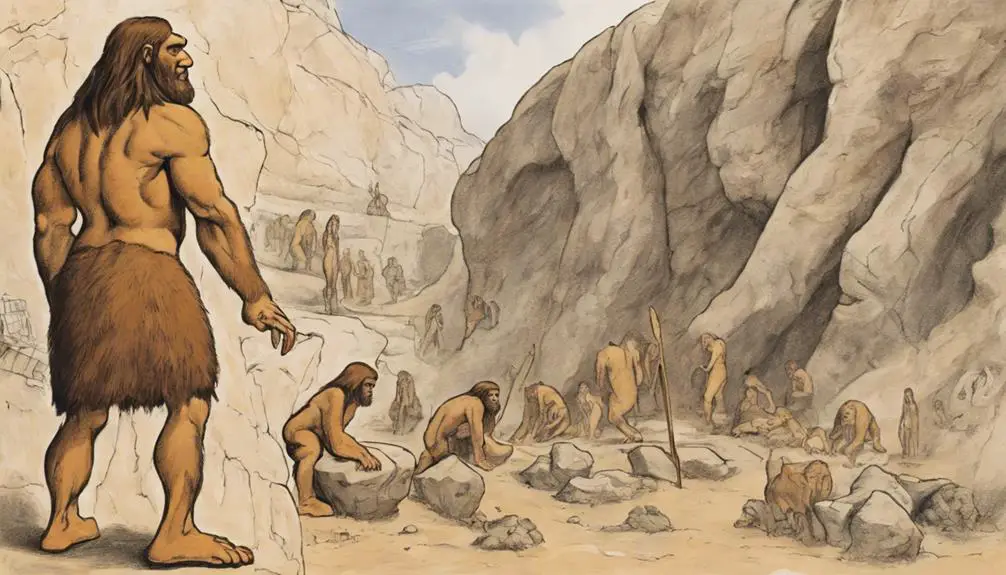
In examining the Bible for potential references to Neanderthals, you'll uncover a fascinating array of interpretations that may shed light on these prehistoric humans' possible place within biblical narratives. Your exploration can lead you to some intriguing conclusions.
For instance, the Bible, specifically in the book of Genesis, mentions 'Nephilim', a race of giants that roamed the Earth. Some scholars have suggested a parallel between these 'Nephilim' and Neanderthals, based on their physical stature and the time period. While this is speculative, it's an intriguing possibility, nonetheless.
Moreover, the notion of 'Neanderthals' spirituality' can also be explored within a Biblical context. It's well-documented that Neanderthals displayed a degree of spirituality, evidenced by their burial rituals. Some Biblical interpretations may suggest that these acts of reverence towards the dead align with the Biblical principle of respect for the deceased.
However, it's crucial to note that such interpretations are speculative and should be viewed as potential hypotheses rather than definitive evidence. The Bible doesn't explicitly mention Neanderthals, and any connection made is typically based on anachronistic readings and symbolic interpretation. Thus, while fascinating, these interpretations should be approached with scholarly caution.
Archaeological Evidence and Biblical Accounts
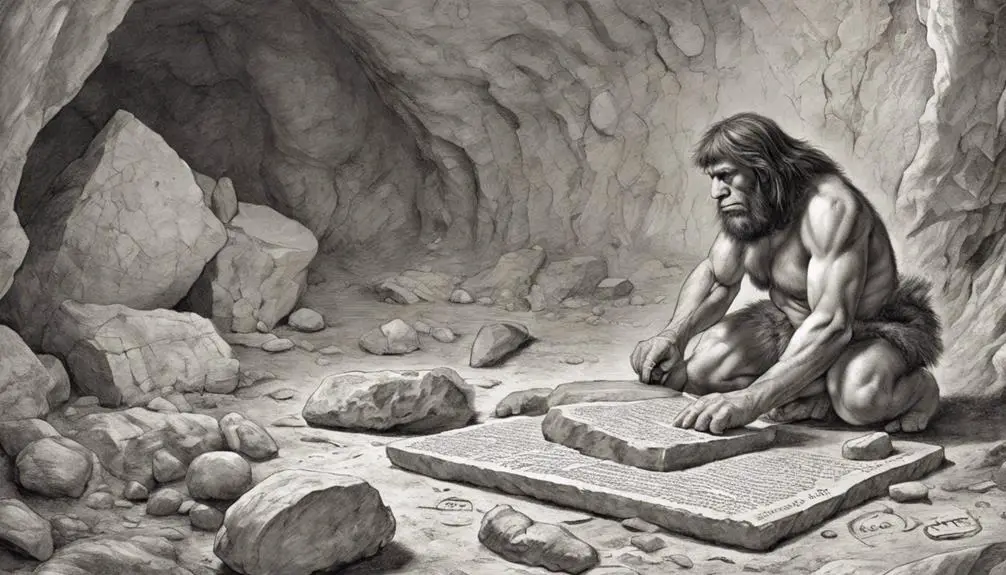
When examining archaeological findings, you'll discover that these tangible remnants often provide an interesting counterpoint to biblical accounts, potentially offering fresh insights into the lives of Neanderthals. Archaeological evidence, particularly aspects of Neanderthal religion, can shed light on the social and spiritual dimensions of these early humans.
Recent findings reveal that Neanderthals may have conducted burial rituals and other religious practices. This contrasts with common biblical interpretations, where Neanderthals are often overlooked or considered less advanced. Moreover, the discovery of Neanderthal hyoid bones, crucial for speech, could suggest a capacity for language and, perhaps, a form of spiritual expression.
In terms of biblical accuracy, the archaeological record doesn't necessarily contradict the Bible, but it does compel us to reevaluate our interpretations. The Bible provides a historical framework, but it isn't a comprehensive record of human evolution. Therefore, the presence of Neanderthals in the archaeological record doesn't disrupt biblical chronology, rather it expands our understanding of it.
In essence, archaeological evidence and biblical accounts aren't conflicting sources of information but complementary ones. When you consider both, you'll find a fuller, more nuanced understanding of our shared past, including the role and significance of Neanderthals.
Debating Neanderthals' Existence in Biblical Era
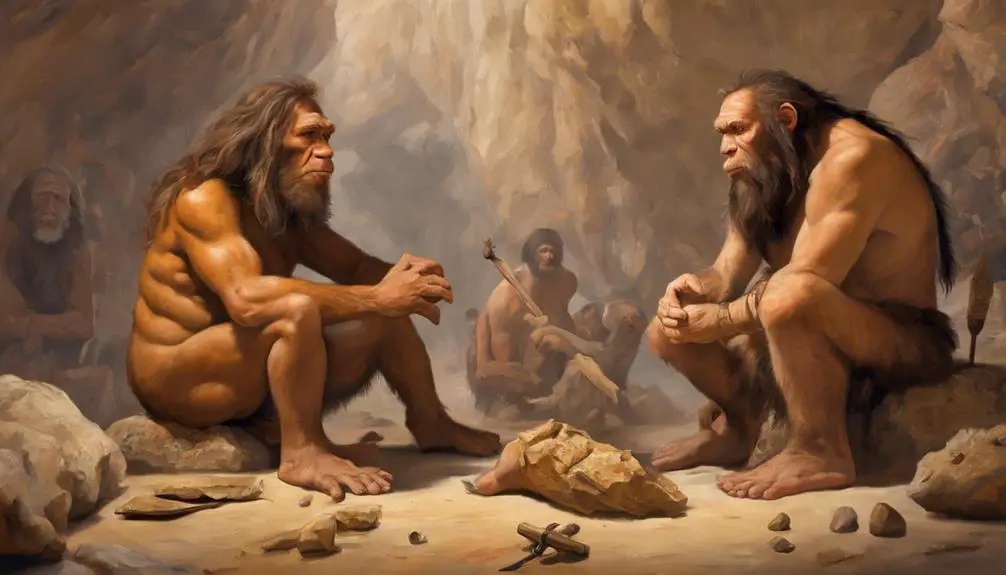
How do we reconcile the existence of Neanderthals, supported by substantial archaeological evidence, with the biblical era that seemingly doesn't mention them? It's a debate that's both complex and intriguing. To find a middle ground, you need to delve deep into Neanderthal depictions and biblical interpretations.
Consider first that Neanderthals predate the biblical timeline. As such, their absence from biblical texts might simply be due to chronology. However, it's also possible that Neanderthals could've been alluded to indirectly. Some scholars propose that biblical giants or 'Nephilim' might be Neanderthals, given their robust physical attributes. This, however, remains speculative.
Delving into biblical interpretations, it's crucial to remember that biblical texts aren't meant to be comprehensive historical records. They provide spiritual guidance more than anthropological facts. The absence of explicit Neanderthal references mightn't necessarily negate their existence during the biblical era.
As you navigate this debate, it's key to balance scientific evidence with religious texts. While the Bible doesn't directly mention Neanderthals, it doesn't deny their existence either. Thus, the reconciliation lies in understanding the nature of both sources and appreciating the possible overlaps and gaps.
Frequently Asked Questions
Did Neanderthals Have Any Specific Spiritual or Religious Beliefs?
You're asking if Neanderthals held any specific spiritual or religious beliefs. While we can't be certain, evidence suggests they may have.
Instances of Neanderthal artistry and potential spiritual symbols suggest a degree of symbolic thought, which might indicate some form of spirituality. However, without direct evidence, it's hard to fully understand the nuances of their beliefs.
What Is the Genetic Relationship Between Modern Humans and Neanderthals?
You're linked to Neanderthals through shared ancestry and DNA. Studies show that about 2% of the DNA in non-African modern humans comes from Neanderthals. This interbreeding, which occurred multiple times, reveals a more complex picture of our prehistoric relatives' evolution and intelligence.
How Did the Neanderthals Become Extinct and Could Their Extinction Have Been Recorded in the Bible?
You're asking about Neanderthal extinction and potential Biblical interpretations.
It's believed that Neanderthals became extinct around 40,000 years ago, likely due to climate change and competition with modern humans.
As for Neanderthal representations in the Bible, it's important to note the Bible was written long after their extinction. Therefore, any connections would be speculative and based on interpretation, not direct evidence.
Are There Any Distinct Cultural Practices of Neanderthals That Have Been Identified in the Archaeological Record?
You've asked about Neanderthal cultural practices identified archaeologically. Well, evidence of Neanderthal artistry and language certainly exists.
Cave paintings, carvings, and musical instruments attest to their artistic abilities, while language use is inferred from their complex social structures and tool-making skills.
Hence, it's clear they had distinct cultural practices, though we're still piecing together the full extent of their cultural repertoire.
How Did the Environment and Climate of the Era Influence the Lifestyle and Survival of Neanderthals?
You see, the harsh and fluctuating climate greatly influenced the Neanderthals' lifestyle. It dictated their migration patterns and diet. They'd to adapt, becoming skilled hunters of large game in their cooler environments.
When food was scarce, they'd migrate in search of sustenance. Their diet, rich in meat, was a direct response to their cold surroundings. Thus, environment and climate were crucial for their survival.
Conclusion
In conclusion, you've seen how understanding Neanderthals, biblical timelines, and prehistoric man intertwine intriguingly.
You've examined potential biblical references to Neanderthals and weighed archaeological evidence against biblical accounts.
You've grappled with the debate on Neanderthals' existence in the biblical era.
It's clear that further study is needed to fully comprehend the place of Neanderthals within biblical narratives, a fascinating intersection of science, history, and theology.



Sign up